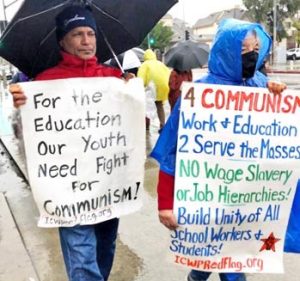The Role of Communists in Sharpening Capitalist Crisis here ♦ Some Criticisms of Party’s Role in LA School Strike here ♦ Response to Criticism here ♦

From the Philippines to the USA: What Is the Communist Role in Sharpening Capitalist Crisis?
SEATTLE (US), April 16— “What news do you bring today?” a young teacher asked a comrade distributing Red Flag.
“There’s a surge in workers’ strikes and rebellions around the world,” our comrade began.
“I noticed,” she cut off the comrade. “Give me extra papers to bring to my classroom.”
Comrades followed up this exchange when our collective met.
First, we discussed the huge Jeepney strike in the Philippines. Filipino-American activists had just returned from a visit to the Philippines. For three days, every major city there came to a standstill when 100,000 Jeepney drivers and mechanics struck. Since 2017, when the Duterte regime proposed eliminating Jeepney transportation, drivers and mechanics have been demonstrating and striking.
After World War II, the US army left small buses in the Philippines. Innovative workers turned them into colorful Jeepneys. The average driver makes $6.00/day (US), while the average ride costs 22 cents.
Billionaires who run the largest bank in the Philippines, allied with the government, are destroying this means of transportation, essential for low-wage Filipino workers. The billionaire bankers will make great fortunes at the expense of the drivers, mechanics, and riders. By December, drivers and mechanics will have to submit to super-exploitive wage slavery, while low-wage workers will face exorbitant transportation costs.
If anything illustrates the anger of the working class and the futility of trying to reform capitalism, it is this strike. Despite five years of massive, militant strikes, the Filipino ruling class’s plans remain intact.
In communism, the working class will collectively assure we have the free transportation necessary for work and leisure. Profits, banks, and ruling class fortunes won’t play a part. Communist revolution will eliminate all that along with the ruling class itself.
Coming Home to Communism
After the report from the Philippines, comrades reflected on their own political work. Everyone agreed that workers were on the move.
“But what is my role?” asked J, a US-based comrade. “That’s what I’m most concerned about.”
Over decades of political struggle, J had built an extensive network of anti-racist activists. “But I haven’t promoted communism,” he concluded.
Comrade D had built a similar network of industrial workers. Over the years, he had gradually put the struggle to develop communist organizers on the back burner. To correct this error, he had already taken the initiative to brush up on communist ideology. He promised to continue the struggle with his comrades in local and International Committee meetings—and in his network.
Recent conversations in our last few meetings about how to recruit more communists built on the strengths of these networks. Reformist campaigns were not working, so these two comrades decided to focus on developing relationships that advance communist recruitment. They will continue to document this journey in Red Flag.
The struggle in party collectives to bring communist solutions to class battles whenever possible is indispensable. ICWP’s communist work inspires comrades and potential comrades.
Obstacles and…
Communists don’t emerge out of the clear blue sky. Even millions in revolt won’t guarantee the growth of the Party necessary for communist revolution. Being aware of the capitalist crisis around us is not enough.
For centuries, the ruling classes have built institutions—and ideologies such as racism, sexism, and nationalism—to divert our class from the fight for communism. Among garment workers, evangelical religions hold back some friends. Some religions promote passivity. Others—like Hindu nationalism—promote the slaughter of Muslims.
Many workers, as in the Philippines, are attracted to trade union militancy. These strikers and the millions more around the world who are bravely fighting capitalist exploitation (and many of their supporters) do not intend to preserve the capitalist system.
Nonetheless, reliance on capitalist reforms sidetracks our class (including potential communist recruits) from the need to build for communist revolution. Communism is the only way to end capitalist exploitation. Comrades bring this message to every battle, most successfully when we develop close relationships with those who are fighting.
Opportunity
Our role in these tumultuous times is to counter these diversions. Mobilizing the masses for communism requires rock-solid political and social relationships. We can nurture these relationships on the picket line, in the streets, at collective meetings, at social/political events, and in classrooms, barracks, and worksites. The more active the working class, the more we must invite these workers into our homes and lives. That’s how the Party will grow.
As we build the party, these relationships will form the basis of a communist society. Collective social relations will replace capitalist exploitive relations like those between employer and employees.
ICWP serves the masses. We do that by building communist relationships now to grow the party and provide a firm footing for our future communist society.
Read Our Manifesto Mobilize the Masses for Communism here
Some Criticisms of Party’s Work in LA Schools Strike
In the LA school strike, we massified our communist ideas, reconnected with old friends, and made new ones. Our young comrade teachers actively participated as communists.
All good things. However, criticism is always useful and necessary.
At the first mass mobilization, our literature was teachercentric. It only mentioned the striking workers once.
It could have emphasized that not the teachers, but only those low paid workers, could shut the schools down.
Knowing this, the treacherous UTLA leaders used it to come out as heroes by sanctioning the teachers walk-out. We could have anticipated this and exposed them.
We could have applauded the teachers for walking out and simultaneously exposed the miserable wages other school workers slave for. After working for 23 years some only make $23/hr. Others were still starting at $11/hr.
This was an opportunity to attack the wage system and explain that trade unionism will never end it. Union contracts enforce and legalize it. Competing for jobs pits us against each other – dividing and preventing us from organizing a communist revolution to end capitalism, its wage slavery, and its inequalities.
Capitalist schooling, with its titles and diplomas, justifies and enforces capitalism’s wage differential, creating a huge divide between manual and mental labor. Only communism can end that division with lifelong learning for everyone. We will all be both teachers and students, without titles, diplomas, or privileges for anyone.
That’s our fight, not fighting for reforms. Even a 30% wage increase will prove meaningless in the face of rising inflation. Wages (money) are the chains that bind us to the capitalists.
Unions preach reformism and electoral politics as the solution. Their leaders use rabid anticommunism to isolate workers from communist ideas.
Our literature didn’t mention the period we are in a deepening worldwide economic crisis, the dollar declining, banks collapsing. This is accelerating the capitalists’ and imperialists’ s drive to fascism and world war to save their system.
We could have stressed that students and youth are future industrial workers and soldiers. Two key sectors for revolution.
The first article ended with a call to recruit students to build an “international party that can mobilize, educate and sustain our needs.”
We needed a more direct call to teachers to teach communist revolutionary ideas to students – NOW. And to students to join ICWP to go into industry and the army to win industrial workers to organize a communist revolution and soldiers to turn their guns around to support them.
One conclusion we got from the strike was: “The unity on the picket line was a victory for class consciousness.” Class consciousness – like class struggle itself – can be reformist class consciousness or revolutionary communist class consciousness. This strike and its outcome reinforced most workers’ reformist outlook. Undoubtedly, our literature and conversations impacted some and advanced their revolutionary outlook. With more ties and struggle, this can deepen and expand.
Mass revolutionary communist class consciousness requires mass revolutionary communist class struggle with deep communist relations. That’s the challenge we face.
—Comrades in Los Angeles (USA)

Response: What’s the main thing?
Thanks for your comments. We read an earlier draft of this letter in our club meeting. It seems that the criticism is not of our participation in the strike, but a disagreement over the emphasis in the leaflets we wrote collectively.
As we said at the start of the strike action, we decided to (1) develop our younger cadre and (2) center our struggle around the main contradiction in education. We wanted to argue that public schools are not “our” schools but instead serve the needs of capitalism. They aim to produce disciplined youth trained in individual task completion and so accustomed to displaying varying levels of competencies that they think the class system capitalism needs is a natural mark of productive society.
Many teachers and students, of course, resist these aims in their day-to-day work. Our leaflets and personal struggles aimed to develop that resistance into a class consciousness that understands why workers who create all value can in fact organize and run society.
This struggle around class consciousness is alive right now. Shocked by the display of class unity, a right- wing trend is gaining traction by belittling the strike. Using the big hole in teachers’ paychecks, this trend downplays the contributions of non-teaching workers to the strike. So, the struggle continues but because we concentrated on developing younger cadre, we are in a better position to fight the counterattack and grow.
We agree with the urgent need to raise the dangers of inter-imperialist war and to develop a deeper analysis of the wage system. Certainly, the strike of 65,000 school workers (uniting “professional” and “non-professional” workers) is a significant event that reverberates throughout working-class Los Angeles. Commenting on it and drawing lessons from it is not the sole property of educational workers! We urge the collectives involved in agitation among garment and transit workers to add to our understanding of it.
–Comrades in the West Coast Schools Collective

